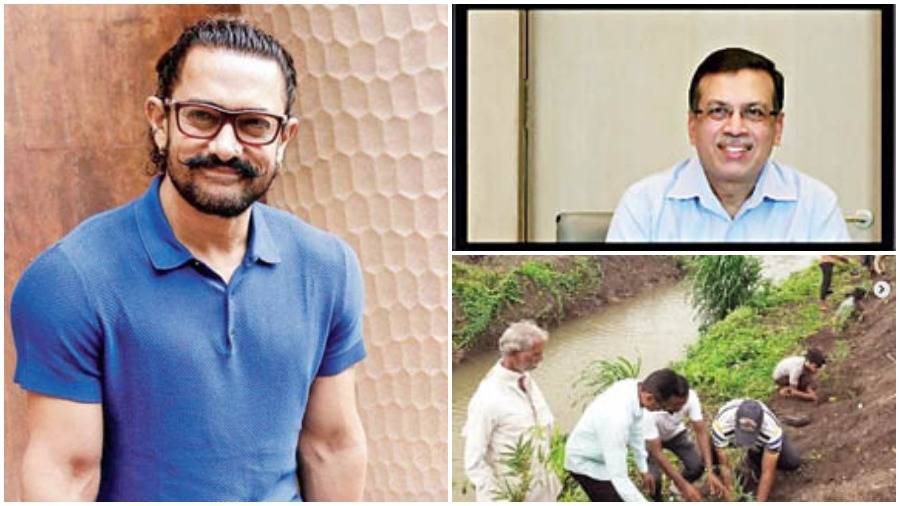No conversation on water conservation is complete without the mention of Paani Foundation,” began Vikash Agarwal at the annual session of the Indian Chamber of Commerce (ICC) as he introduced the speaker of the afternoon –– Aamir Khan. His Paani Foundation works relentlessly in Maharashtra for soil and water conservation, proving repeatedly that collective action can bring change. Sanjiv Goenka, chairman RPG Sanjeev Goenka group and head advisory council chair of ICC, welcomed his “dear friend” Aamir saying, “He is somebody who has redefined the bar. My company was fortunate enough to do the music of his film Jo Jeeta Wohi Sikander and even then he redefined boundaries, pushing himself endlessly. Every time you meet him you are awed by his sincerity, warmth, humility.”
The inception
Aamir Khan began speaking of his journey with Paani Foundation, tracing it back to his three-year-long stint with his show Satyamev Jayate, which he claimed to be a huge learning experience for him. “We got to know what India is and how people live across the country and have done so much for people around them,” he said. The show had a deep impact on ground and playing the role of communicators, the show connected grass root problems with an audience around the world. Trying to understand each topic and relate the stories enabled the show makers to come to the realisation that they wanted to do more work.
Director Satya and Aamir both wanted to pick up a topic and continue through with it and work more deeply at a grassroot level. “It was a coincidence that he and I both thought of water,” Aamir added. The entire team of Satyamev Jayate has now come into The Paani Foundation led by Kiran Rao and Aamir with Satya as the CEO and Reena Dutta as the COO of this non-profit outfit.
Watershed management
The first year of the company, the team spent travelling to various parts of Maharashtra to every village, to understand the workings and situations there. Predecessors who were already doing great work in water management had many lessons to impart and Aamir’s team was hungry to learn. The findings of that research led to interesting discoveries like flourishing villages in rain shadow regions because of watershed management, which involved crop planning and learning how to use water. “However, the question we had in our minds was if one village had figured out a way to make things work, why didn’t the next village adapt that? That is where the problem lay –– the science was available but instead of making it the norm, people tend to believe that it’s a miracle village,” Aamir said. It was propagating the good practices led by science that Paani Foundation decided to work upon.
Strength in unity
The second factor that works for successful villages is the process of working together. “When you are working in water, the community has to be like a bowl. There can’t be any gaps as the water will flow through,” Aamir said. All the success stories of certain villages had people working together and treating water as a collective responsibility, seamlessly. Thus, getting people together became the most important founding motto for the Paani Foundation. He cited various challenges like political differences, caste, religion playing hindrance to a seemingly easy solution of community building in Maharashtra. There are roughly 86,000 revenue villages in Maharashtra, which is bigger than several European countries, cited Aamir. So the task at hand was mammoth. It was also what led to the inception of the Satyamev Jayate Water Cup which ran from 2016 to 2019. Villagers were given training on watershed management and then made to compete with each other for best water and soil management in their villages. “We felt that if we create something that people want to be a part of, it would be successful. It was a rigorous affair with ‘shramdaan’ being the most crucial factor. With immense cooperation from the government, the Paani Foundation managed to train people from the villages who would go back and teach the rest and make them completely independent.
The bigger picture
The foundation’s work increased the general sense of well-being in every village. The crops gave better yield, the quality of milk from cattle became better because the grass was growing better in the villages. This kind of trickle-down effect resulted in an elevated lifestyle for every farmer, thereby reducing migration. Aamir called for corporate participation as a way forward. “You already are doing very good work which we get to see when we do fieldwork. However, we can’t just be looking at water in isolation when addressing this topic. We also need to look at soil regeneration, creating grasslands, reforestation, crop planning and water management. So from the fifth year onwards, the competition changed from 45-day contest to a two-year one,” Aamir summarised.
Do more is the only mantra forward and Aamir’s Paani Foundation is achieving exactly that. “Change won’t be easy if it isn”t a community movement. So it is not only on the top management to do the work. The onus lies on every individual, whether it be giving or learning,” he ended.
